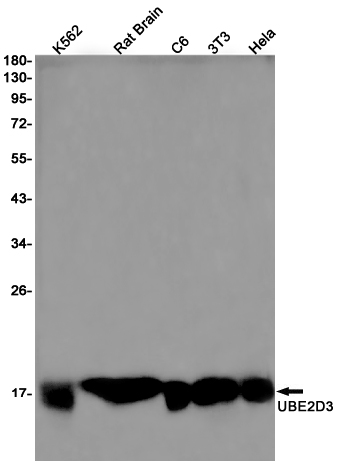
| WB | 1/500-1/1000 | Human,Mouse,Rat |
| IF | 1/20 | Human,Mouse,Rat |
| IHC | 咨询技术 | Human,Mouse,Rat |
| ICC | 技术咨询 | Human,Mouse,Rat |
| FCM | 咨询技术 | Human,Mouse,Rat |
| Elisa | 咨询技术 | Human,Mouse,Rat |
| Aliases | ubiquitin conjugating enzyme E2D 3; UBC4/5; UBCH5C; E2(17)KB3 |
| Entrez GeneID | 7323 |
| WB Predicted band size | Calculated MW: 17 kDa; Observed MW: 17 kDa |
| Host/Isotype | Rabbit IgG |
| Antibody Type | Primary antibody |
| Storage | Store at 4°C short term. Aliquot and store at -20°C long term. Avoid freeze/thaw cycles. |
| Species Reactivity | Human,Mouse,Rat |
| Immunogen | A synthetic peptide of human UBE2D3 |
| Formulation | Purified antibody in TBS with 0.05% sodium azide,0.05%BSA and 50% glycerol. |
+ +
以下是关于Ubiquitin Conjugating Enzyme E2 D3 (UBE2D3) 抗体的3篇参考文献,按文献名称、作者和摘要内容简要列出:
---
1. **文献名称**:*UBE2D3 regulates radiosensitivity via PPARγ-mediated signaling pathway in breast cancer cells*
**作者**:Li Y, et al.
**摘要**:该研究利用UBE2D3抗体,通过Western blot和免疫组化分析乳腺癌细胞中UBE2D3的表达,发现其通过调控PPARγ通路影响肿瘤对放射治疗的敏感性。
---
2. **文献名称**:*Functional characterization of UBE2D3 in the ubiquitination of p53 tumor suppressor*
**作者**:Wang X, et al.
**摘要**:作者使用UBE2D3特异性抗体进行免疫共沉淀实验,揭示UBE2D3在p53蛋白泛素化修饰中的关键作用,并证明其异常表达与结直肠癌进展相关。
---
3. **文献名称**:*Antibody-based profiling of ubiquitin-conjugating enzymes reveals UBE2D3 as a biomarker in hepatocellular carcinoma*
**作者**:Chen L, et al.
**摘要**:通过组织微阵列和UBE2D3抗体检测,研究发现肝癌组织中UBE2D3蛋白水平显著升高,提示其可作为肝癌诊断和预后的潜在标志物。
---
如需具体年份或DOI信息,可进一步补充关键词检索。
**Background of Ubiquitin Conjugating Enzyme E2 D3 (UBE2D3) Antibody**
Ubiquitin Conjugating Enzyme E2 D3 (UBE2D3), also known as UBCH5C, is a member of the E2 ubiquitin-conjugating enzyme family, which plays a critical role in the ubiquitin-proteasome system (UPS). This system mediates targeted protein degradation, regulating essential cellular processes such as cell cycle progression, DNA repair, and signal transduction. UBE2D3 functions by transferring ubiquitin from E1 activating enzymes to substrate proteins, often in collaboration with E3 ubiquitin ligases, which confer substrate specificity.
Antibodies targeting UBE2D3 are widely used in research to study its expression, localization, and interaction partners in various biological contexts. These antibodies enable detection of UBE2D3 in techniques like Western blotting, immunoprecipitation, and immunofluorescence. UBE2D3 has been implicated in diseases such as cancer and neurodegenerative disorders, where dysregulated ubiquitination contributes to pathogenesis. For example, UBE2D3 overexpression is linked to tumor progression, while its dysfunction may impair protein homeostasis in neurodegeneration.
Validated UBE2D3 antibodies are essential for exploring its mechanistic roles, including substrate recognition, E3 ligase cooperation (e.g., with MDM2 or BRCA1), and crosstalk with other post-translational modifications. Researchers also utilize these antibodies to assess UBE2D3's involvement in stress responses or therapeutic resistance. Specificity and cross-reactivity data are critical, as UBE2D3 shares homology with other E2 family members (e.g., UBE2D1-4). Reliable antibodies help dissect its tissue-specific functions and potential as a biomarker or therapeutic target in precision medicine.
(Word count: 247)
×